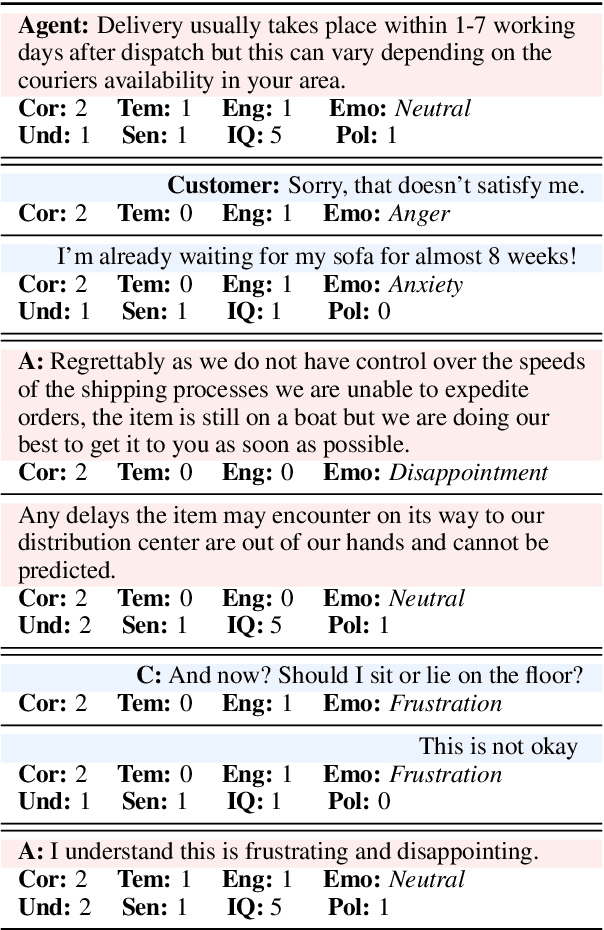Vera Cabarrão
Findings of the WMT 2024 Shared Task on Chat Translation
Oct 15, 2024



Abstract:This paper presents the findings from the third edition of the Chat Translation Shared Task. As with previous editions, the task involved translating bilingual customer support conversations, specifically focusing on the impact of conversation context in translation quality and evaluation. We also include two new language pairs: English-Korean and English-Dutch, in addition to the set of language pairs from previous editions: English-German, English-French, and English-Brazilian Portuguese. We received 22 primary submissions and 32 contrastive submissions from eight teams, with each language pair having participation from at least three teams. We evaluated the systems comprehensively using both automatic metrics and human judgments via a direct assessment framework. The official rankings for each language pair were determined based on human evaluation scores, considering performance in both translation directions--agent and customer. Our analysis shows that while the systems excelled at translating individual turns, there is room for improvement in overall conversation-level translation quality.
Dialogue Quality and Emotion Annotations for Customer Support Conversations
Nov 23, 2023



Abstract:Task-oriented conversational datasets often lack topic variability and linguistic diversity. However, with the advent of Large Language Models (LLMs) pretrained on extensive, multilingual and diverse text data, these limitations seem overcome. Nevertheless, their generalisability to different languages and domains in dialogue applications remains uncertain without benchmarking datasets. This paper presents a holistic annotation approach for emotion and conversational quality in the context of bilingual customer support conversations. By performing annotations that take into consideration the complete instances that compose a conversation, one can form a broader perspective of the dialogue as a whole. Furthermore, it provides a unique and valuable resource for the development of text classification models. To this end, we present benchmarks for Emotion Recognition and Dialogue Quality Estimation and show that further research is needed to leverage these models in a production setting.
Towards Using Machine Translation Techniques to Induce Multilingual Lexica of Discourse Markers
Mar 31, 2015Abstract:Discourse markers are universal linguistic events subject to language variation. Although an extensive literature has already reported language specific traits of these events, little has been said on their cross-language behavior and on building an inventory of multilingual lexica of discourse markers. This work describes new methods and approaches for the description, classification, and annotation of discourse markers in the specific domain of the Europarl corpus. The study of discourse markers in the context of translation is crucial due to the idiomatic nature of these structures. Multilingual lexica together with the functional analysis of such structures are useful tools for the hard task of translating discourse markers into possible equivalents from one language to another. Using Daniel Marcu's validated discourse markers for English, extracted from the Brown Corpus, our purpose is to build multilingual lexica of discourse markers for other languages, based on machine translation techniques. The major assumption in this study is that the usage of a discourse marker is independent of the language, i.e., the rhetorical function of a discourse marker in a sentence in one language is equivalent to the rhetorical function of the same discourse marker in another language.
 Add to Chrome
Add to Chrome Add to Firefox
Add to Firefox Add to Edge
Add to Edge